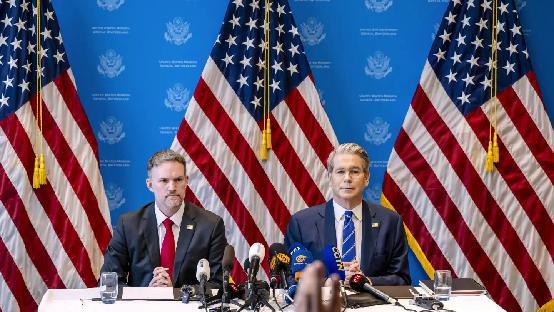
The United States and China announced on Monday that they have agreed to cut the recently imposed large-scale tariffs and restart stalled trade between the world's two largest economies. According to a joint statement negotiated by US and Chinese officials in Geneva, the two countries will temporarily reduce tariffs on each other's imported goods. The agreement stipulates that by May 14th, the United States will reduce tariffs on Chinese goods from 145% to 30%, and China will reduce tariffs from 125% to 10% for a period of 90 days.
US Treasury Secretary Scott Besant said at a press conference after two days of negotiations that high tariff levels would result in complete obstruction of goods from both sides, which is an outcome that neither side wants to see. And therefore announced tariff reductions. Officials have made positive statements, stating that both sides have established a consultation mechanism to continue discussing trade issues. The consensus reached by both delegations over the weekend is that neither side wants decoupling, "Besent said." And these high tariffs have led to a blockade that is equivalent to an embargo. Neither side wants that. We do want trade. We want to achieve more balanced trade. I believe both sides are committed to achieving this goal
This statement is an important step in calming the trade tensions between the two countries, which have been strained since April 2nd when President Donald Trump announced "Liberation Day" tariffs on $200 billion worth of Chinese goods. The trade war between Trump and China began in February when he announced a 10% tariff on Chinese imports. By April, Trump will raise tariffs on China to a shocking 145%. China will also raise tariffs on American products to 125% as a countermeasure.
With the signing of the agreement, the situation between the two parties began to ease and triggered a rebound in the global financial market. However, President Donald Trump's trade war downgrade has not resolved the fundamental differences between Beijing and Washington. The agreement will last for 90 days, creating time for US and Chinese negotiators to reach a more substantive agreement.
The statements from the United States and China led to a surge in the stock market, and investors were overjoyed, with US futures rising by over 2%. The Hang Seng Index in Hong Kong surged nearly 3%, while benchmark indices in Germany and France both rose 0.7%. Futures on the S&P 500 Index and the Dow Jones Industrial Average also began to rise. Oil prices have started to soar, and the exchange rates of the US dollar against the euro and Japanese yen have risen.
Despite the short-term surge in global stock markets after the agreement was reached, the market is generally concerned about the uncertainty after the 90 day window period. US Treasury Secretary Benson frankly stated that "reshaping trade relations will take several years", and coupled with the agreement not involving structural contradictions such as technological barriers and intellectual property rights, it may trigger cyclical fluctuations in the financial market's risk aversion towards the subsequent breakdown of negotiations. Southeast Asian countries are accelerating their acceptance of China's transfer of production capacity during the tariff window period. If there are repeated negotiations between China and the United States, global capital will reassess the value of emerging market assets, which may exacerbate the valuation differentiation between Southeast Asian stock markets and European and American markets. Although the agreement has put a pause on the trade war, the true turning point in the market still needs to be observed in the 90 day game between China and the United States in areas such as industrial subsidies and digital economy rules. The unresolved structural contradictions make it difficult for financial markets to achieve a true 'calm period'.

Driven by the Trump administration's push to relax financial regulations and the recovery of investment banking business, the market value of the six major banks in the United States has cumulatively increased by approximately 600 billion US dollars by 2025.
Driven by the Trump administration's push to relax financia…
On Christmas evening, U.S. President Trump posted on social…
According to multiple foreign media reports, the recent fin…
The middle class, once regarded as the cornerstone of Ameri…
On December 19th local time, the US military launched a lar…
The Boxing Day sunshine should have cast a false glow of pr…